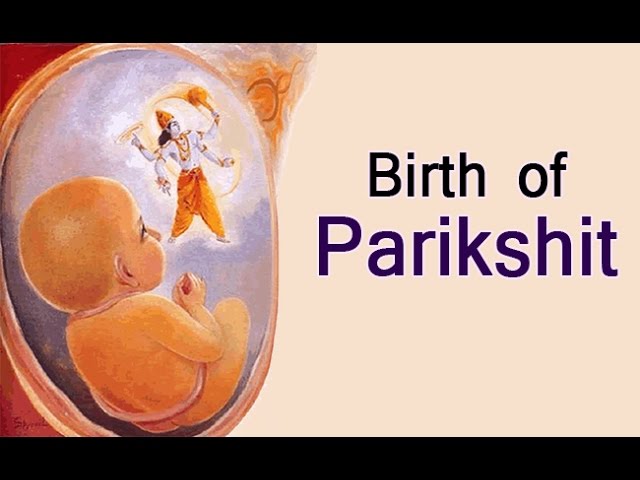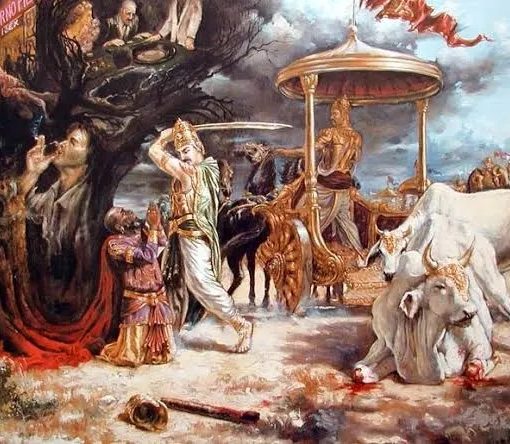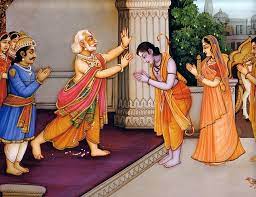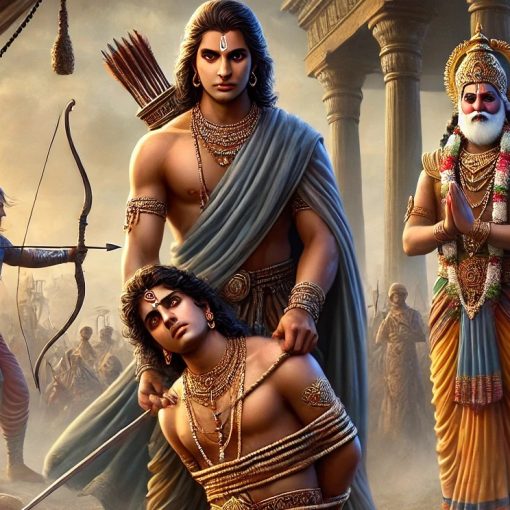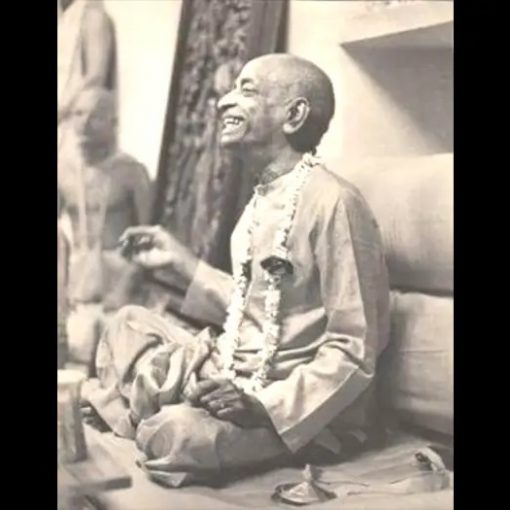Chapter Twelve of the Śrīmad-Bhāgavatam presents the auspicious birth and destiny of Mahārāja Parīkṣit, the grandson of Arjuna and the son of Abhimanyu and Uttarā. This chapter unfolds the divine protection granted to Parīkṣit in his mother’s womb and the prophecies of his future greatness. It offers profound lessons on hope, divine grace, and the value of a righteous ruler in a world often plagued by material challenges.
Divine Protection: Krishna Saves Parīkṣit in the Womb
At the beginning of the chapter, we learn that Parīkṣit was miraculously saved by Lord Krishna while still in the womb. When Aśvatthāmā, a vengeful warrior, releases the Brahmāstra weapon to destroy the unborn Parīkṣit, the child’s mother, Uttarā, desperately seeks Krishna’s protection. Krishna responds immediately, entering the womb to shield the unborn child from the fiery weapon. The Lord’s intervention not only ensures the child’s survival but also sets the stage for his role as a righteous monarch.
This story is a profound reminder of Krishna’s personal care for His devotees. Even when circumstances appear hopeless, Krishna’s divine presence can turn the tide. It teaches us that Krishna’s protection transcends time and space; it reaches even into the womb of a mother. In life, we often face situations that seem overwhelming, but just like Uttarā, we can call out to Krishna with sincerity. His protective grace is always available, ensuring that His devotees are never truly abandoned, even in the darkest moments.
Parīkṣit’s Birth: A Symbol of Hope and Renewal
The birth of Parīkṣit marks a moment of hope and renewal for the Kuru dynasty, which had suffered immense losses during the Mahābhārata war. The Pandavas, despite winning the war, are left with deep wounds and the loss of many loved ones. Parīkṣit’s birth symbolizes a fresh beginning—a new chapter of righteousness and peace under the guidance of a virtuous king. The sages predict that Parīkṣit will be a great monarch, dedicated to dharma and the welfare of his people.
This teaches us the importance of hope in the face of adversity. Life is cyclical, filled with ups and downs, victories and losses. Yet, like Parīkṣit’s birth, every challenge is often followed by the promise of a new beginning. As devotees, we should hold on to hope, trusting that Krishna has a greater plan even when things seem bleak. Just as Parīkṣit’s birth brought solace to the Pandavas, Krishna’s plan often unfolds with unexpected blessings.
The Naming Ceremony: Values and Vision for a Righteous King
As per Vedic tradition, a grand ceremony is held to name the newborn prince. Mahārāja Yudhiṣṭhira, Parīkṣit’s uncle, invites the greatest brāhmaṇas and sages, including Kripacharya, Dhaumya, and Vyāsa, to bless the child and conduct the rituals. This ceremony is not merely a formal event; it is filled with prayers, prophecies, and spiritual blessings that set the foundation for Parīkṣit’s character and life.
The name “Parīkṣit” means “one who examines” or “one who is constantly searching.” It signifies the child’s inclination to seek the truth, inspired by the vision of Krishna, whom he had seen in the womb. Throughout his life, Parīkṣit would embody this spirit of inquiry, always seeking dharma and truth, guided by his unwavering faith in Krishna.
From this, we learn the importance of values in shaping a person’s character. Names, rituals, and early teachings play a vital role in nurturing a child’s virtues. In today’s context, this chapter emphasizes the role of spiritual education in early childhood. Teaching children about God, morality, and righteousness at a young age can lay a strong foundation for their future. Just as the sages blessed Parīkṣit with values and virtues, we must strive to provide children with an environment filled with spiritual teachings, compassion, and love.
Prophecies About Parīkṣit: Living with Dharma
The sages prophesize that Parīkṣit will be a ruler like his forefathers, embodying virtues such as righteousness, devotion, protection of citizens, and fairness in administration. They describe his future exploits, emphasizing his dedication to dharma and his commitment to the welfare of his subjects. Parīkṣit is foretold to be an ideal king, who would ensure peace and prosperity in the kingdom, guided by the principles of morality and justice.
This prophecy not only speaks of Parīkṣit’s greatness but also highlights the qualities of an ideal leader. In the modern world, leaders are often driven by personal ambitions or material goals. However, the Bhāgavatam presents a different paradigm—one of leadership rooted in spiritual principles, compassion, and selflessness. As aspiring devotees, we can take inspiration from Parīkṣit’s example, striving to lead with integrity, whether in our families, communities, or workplaces. True leadership is not about power, but about serving others with humility and love.
The Significance of Parīkṣit’s Ascension: Restoring Dharma
With Parīkṣit’s ascension to the throne, the stage is set for the restoration of dharma in the land. He is expected to rule like Lord Rāma, an exemplary king who embodies righteousness. Parīkṣit’s reign is a golden period, where both the king and his subjects live harmoniously, upholding the principles of truth and justice. He ensures the protection of his citizens, treats everyone equally, and fosters a spiritual atmosphere in his kingdom.
This vision of governance emphasizes the importance of dharmic leadership in the world. Just as Parīkṣit protects his kingdom with dharma, we too should strive to uphold righteousness in our lives. Whether we are leaders, parents, or simply members of society, we have a responsibility to promote truth, justice, and spiritual values. By doing so, we contribute to a peaceful, harmonious world, much like Parīkṣit’s kingdom.
A Devotee Leader: Parīkṣit’s Spiritual Inclination
Parīkṣit is not only a righteous king but also a devoted servant of Krishna. From his very birth, his life is marked by Krishna’s grace, and he remains deeply connected to God throughout his life. He constantly seeks the association of saints, listens to scriptures, and upholds the principles of bhakti in his rule. His devotion is not confined to rituals; it is lived in his daily duties and relationships.
As practitioners of bhakti, we can draw inspiration from Parīkṣit’s example. Spirituality is not separate from our daily responsibilities; rather, it is integrated into every aspect of life. Whether it is in our work, family interactions, or social engagements, we should strive to bring Krishna consciousness into all our endeavors. Parīkṣit teaches us that a devotee’s life is not about renouncing responsibilities, but about fulfilling them with a spirit of devotion and service to God.
The Lessons of Parīkṣit’s Life: Facing Challenges with Faith
Throughout his life, Parīkṣit faces various challenges, from being attacked in the womb to ruling a kingdom after a devastating war. Despite these challenges, he remains steadfast in his faith and devotion. His story is a powerful reminder that faith in God is the anchor that helps us navigate life’s storms.
In our own lives, we may encounter difficulties, uncertainties, and even failures. However, like Parīkṣit, we are encouraged to face these challenges with unwavering faith. Krishna never abandons His devotees, no matter how difficult the situation may seem. By remembering Krishna, praying sincerely, and following the path of dharma, we can overcome obstacles and emerge stronger in our spiritual journey.
The Importance of Śrīmad-Bhāgavatam
The birth and life of Parīkṣit are intricately connected to the Śrīmad-Bhāgavatam. It is through Parīkṣit that this great scripture comes to the forefront, as it is recited to him by Śukadeva Gosvāmī during the last seven days of his life. This chapter thus sets the stage for the Śrīmad-Bhāgavatam’s teachings, which focus on bhakti-yoga, the supreme path of devotion to Krishna.
Parīkṣit’s eagerness to hear the Bhāgavatam is a lesson in itself. Despite being a king with many responsibilities, he prioritizes hearing about Krishna above everything else. His enthusiasm for spiritual knowledge teaches us the value of regularly studying sacred texts. Just as Parīkṣit found inspiration, guidance, and solace in the Bhāgavatam, we too can find the answers to life’s deepest questions in this timeless scripture.
The Power of Devotional Heritage
Parīkṣit inherits not only the throne but also the spiritual legacy of the Pandavas. His father, Abhimanyu, was a valiant warrior and a devotee, while his grandfather, Arjuna, was a close companion of Krishna. This lineage of devotion plays a crucial role in shaping Parīkṣit’s spiritual inclinations and character.
The lesson here is the significance of spiritual heritage. As parents, teachers, or elders, we have a responsibility to pass on spiritual values to the next generation. By sharing stories of Krishna, guiding children in bhakti practices, and creating a Krishna-conscious environment at home, we ensure that our children inherit not only material assets but also spiritual wealth. This spiritual legacy, like that of the Pandavas, will serve as a guiding light for future generations.
Final Thoughts: Parīkṣit’s Legacy
Mahārāja Parīkṣit’s birth is a divine event that carries immense spiritual significance. His life story is a testimony to the power of Krishna’s grace, the importance of dharma, and the potential for devotion to transform even the most difficult circumstances. Parīkṣit exemplifies the qualities of an ideal devotee-leader, embodying the virtues of courage, compassion, wisdom, and unwavering faith.
His legacy is not just a story of a king who ruled with righteousness; it is a spiritual inspiration for all seekers of truth. It teaches us that no matter where we are born, no matter the challenges we face, the path of bhakti-yoga is open to everyone. Like Parīkṣit, we are invited to seek Krishna’s shelter, embrace dharma, and dedicate our lives to the service of the Supreme Personality of Godhead, Śrī Krishna.
As we reflect on this chapter, let us strive to cultivate the qualities of Mahārāja Parīkṣit in our own lives—faith, inquiry, devotion, and an unwavering commitment to righteousness. By doing so, we not only honor his legacy but also progress in our journey toward spiritual perfection.

